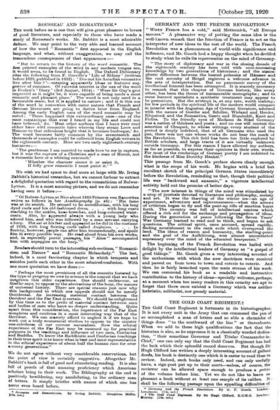ROUSSEAU AND ROMANTICISM.* Two work before us is one that
will give great pleasure to lovers of good literature, and especially to those who have made a study of Rousseau's works. Mr. Babbitt is a most admirable definer. We may point to the very able and learned account of how the word " Romantic " first appeared in the English language, and what, without exaggeration, we may call the tremendous consequences of that appearance :—
" But to return to the history of the word romantic. The first printed examples of the word in any modern tongue are, it would seem, to be found in English. The Oxford Dictionary cites the following from F. Groville's `Life of Sidney' (written before 1628, published in 1652) : ' Doe not his Arcadian romantics live after hun '—meaning apparently ideas or features sug- gestive of romance. Of extreme interest is the use of the word us Evelyn's ' Diary' (3rd August, 1654) : ' Were Sir Guy's grot improved as it might be, it were capable of being made a most romantic and pleasant place.' The word is not only used in a favourable sense, but it is applied to nature ; and it is this use of the word in connexion with outer nature that French and German literatures are going to derive later from England. Among the early English uses of the word romantic may be noted "Mere happened this extraordinary case—one of the most romantique that ever I heard in my life and could not have believed, &c. ' Most other authors that I have ever read either have will romantic tales wherein they strain Love and Honour to that ridiculous height that it becomes burlesque,' &c. The word becomes fairly common by the seventeenth and thousands of examples could be collected from English writers in the eighteenth century. Here are two early eighteenth-century instances The gentleman I am married to made love to me in rapture, but it was the rapture of a Christian and a man of Honor, not a romantic hero or a whining ooxcomb.'
Whether the charmer sinner it or saint it, If folly grow romantic I must paint it.' "
We wish we had apace to deal more at large with Mr. Irving Babbitt's historical researches, but we cannot forbear to extract delightful quotation with regard to the romanticism of Bulwer- Lytton. It is a most amusing picture, and we do not remember having seen it before :—
" Of Bulwer-Lytton at Nice about 1850 Princess von Raoowitza writes as follows in her Autobiography (p. 46) : ' His fame was at its zenith. He seemed to be antediluvian, with his long dyed curls and his old-fashioned dress, . . . with long coats reaching to the ankles, knee-breeches, and long-coloured waist- coats. Also, he appeared always with a young lady who adored him, and who was followed by a man servant carrying a harp. She sat at his feet and appeared as he did in the costume of 1830, with long flowing curls called Atwksises. . . . In Society, however, people ran after him tremendously, and spoilt Sim in every possible way. Ho read aloud from his own works. and, in especially poetic passages, his " Alice " accompanied him with arpeggios on the harp. '
Readers should turn to the interesting sub-sections, " Romanti- cism and Nature" and " Romantic Melancholy." The last, indeed, is a most fascinating chapter in which tempests and suicides jostle each other in the most admired confusion. With one more quotation we have done :—
" Perhaps the most pernicious of all the conceits fostered by the type of progress we owe to science is the conceit that we have outgrown this older experience. One should endeavour, as Goethe says, to oppose to the aberrations of the hour, the masses of universal history. There are special reasons just now why this background to which one appeals should not be merely Occidental. An increasing material contact between the Occident and the Far East is certain. Wo should be enlightened by this time as to the perils of material contact between men and bodies of men who have no deeper understanding. Quito apart from this consideration, the experience of the Far East oomplates and confirms in a meet interesting way that of the Occident. We can scarcely afford to neglect it if we hope to work out a truly ecumenical wisdom to oppose to the sinister one-sidedness of our current naturalism. Now the ethical experience of the Far East may be summed up for practical purposes in the teachings and influence of two men, Confucius and Buddha. To know the Buddhistic and Confucian teachings ki their true spirit is to know what is best and most representative in the ethical experience of about half the human race for over seventy generations."
We do not agree without very considerable reservations, but the point of view is certainly suggestive. Altogether Mr. Babbitt's book is full of good and stimulating reading. It is also full of proofs of that amazing proficiency which American scholars bring to their work. The Bibliography at the end is positively bewildering, nay annihilating, to the ordinary man of letters. It simply bristles with names of which one has never even heard before.
• Rowse= and Beotanticien. By Irving Babbitt. Boughton I17s. nat.)


































 Previous page
Previous page